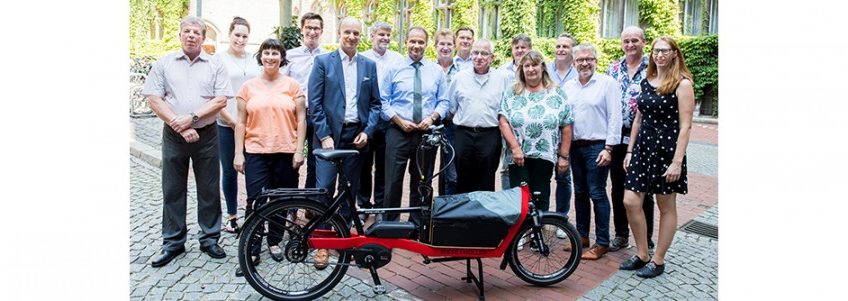The city administration of Braunschweig is adopting a new approach to the mobility of its approximately 4,000 employees when travelling on official business. Mayor Ulrich Markurth presents a comprehensive future concept to the city council for the entire Braunschweig municipality. Mobility on the job is to become simultaneously more diverse and more environmentally friendly, easier and faster to access for all employees, and managed in a cutting-edge manner using digital processes.
Implementation of the concept is to take place on a step-by-step basis. It will commence with the centrally located offices within 250 metres of the town hall and the Ägidienmarkt building as the first “pilot location” with over 1,000 employees. A pool comprising 16 electric vehicles, nine pedelecs and an electric cargo bicycle along with corresponding charging points are to be progressively installed for this purpose.
With an anticipated daily average mileage of 55 kilometres, predominantly in city traffic, the efficiency and emission advantages of electric vehicles are expected to be maximised. The administration assumes that if the concept is fully implemented, it will be possible to significantly reduce the number of vehicles powered by internal combustion engines that are currently in use. This applies in particular to the number of private cars currently used by employees while travelling for business purposes.
In addition, intensive internal communication activities, advisory services, participation processes and incentives are also to be used to encourage employees needing to travel on business to make these trips more frequently using the alternatives of bus, train, bicycle or on foot. During several workshops that were held with staff, this has also emerged to be a wish expressed by employees. The first step will be to procure nine pedelecs and one electric cargo bike. To date, the administration has already deployed six electric vehicles and several pedelecs.
The city was able to claim 80 percent funding from the Federal Ministry of Transport and Digital Infrastructure (BMVI – Bundesministerium für Verkehr und digitale Infrastruktur) from the “Local Electric Mobility” (“Elektromobilität vor Ort”) programme, which is coordinated by NOW GmbH, to cover the costs of developing the electric mobility concept, which amounted to a total of roughly 100,000 euros. During an analysis phase lasting several months, the current situation of official mobility in the city of Braunschweig has been comprehensively examined since 2018 in order to derive potentials for new approaches concerning the mobility of staff on official business, in the future.


